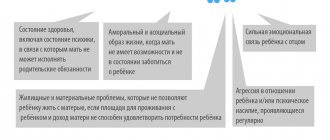In accordance with Article 7 of the Family Code of the Russian Federation, not a single member of the family, no matter what rights he is endowed with and no matter what interests he is guided by, should violate the rights and interests of other family members. Thus, the father and mother of the child have equal rights in relation to their child, and therefore the negative attitude that arose between the spouses during the divorce should not interfere with the favorable upbringing of the common minor child, much less violate his rights.
In this article we will tell you: what rights does a father have in relation to his child? What to do if your ex-spouse does not allow you to see your child? What legal methods can a father use to influence his ex-wife? What liability can a mother be held accountable for preventing a father from interacting with a child?
Father's rights to a child before and after divorce
No matter what arguments the ex-wife uses, the Russian Family Code clearly establishes the equality of parents’ rights to raise children.
And these rights can only be limited by deprivation of court. Contrary to misconceptions, divorce is not a limitation of the father’s rights to the child.
According to the law, after a divorce, the father has equal rights and responsibilities with the mother. He has the right to take care of the baby, spend time with him, and participate in his upbringing.
The father also has the right:
- See your children. Based on the norms of Art. 66 of the RF IC, neither the mother nor the father have the right to prevent the second parent from meeting the baby. If the parents cannot agree, the issue will be resolved by the court.
- Change the baby's last name. If, when registering a birth, a child received his mother’s surname, at his request it can be changed to his father’s.
- Learn about your children from their mother in a timely manner. He has the right to know whether the baby is healthy, where he lives, where he studies.
- Travel outside the Russian Federation with the child with the written consent of the mother. If the mother refuses to provide such permission without reason, the father may file a lawsuit.
Danger
Let’s immediately put dangerous men into a separate category: those who beat their wives and children, are addicted to alcohol, drugs (including those who have “tied up”, because you never know at what moment a person will “untie”), as well as gamers. It should be noted that aggression is expressed not only in beatings.
Aggression is offensive messages in the messenger, it is statements humiliating the mother in front of the child, it is gossip behind her back in conversations with mutual friends and relatives.
He blackmails, spies on his ex-wife; tries to ruin her reputation by spreading rumors in a professional environment; threatens to take her children away from her; without warning, he takes the child from school or kindergarten and takes him to an unknown place... and so on and so forth.
If not divorced
Most citizens believe that mom will take better care of the children than dad. And most fathers are not ready to take responsibility for the upbringing and guardianship of a child. There are also fathers whose communication poses a threat to the mental and physical health of the baby.
But those fathers who want to take part in raising a child, are ready to spend their time and money on their children, but who are prevented from meeting the child by their mother, should know what rights the father has and how to defend them.
Parents can independently agree and even draw up a schedule for visiting the father. But situations often arise when the mother, in violation of the RF IC, prohibits the father from seeing the baby even if the spouses are not divorced, but are temporarily living separately. Mothers justify such restrictions by the fact that the father gives little money to support the baby or by the desire to find a new father for the child.
Such a restriction of the father’s rights is obviously illegal and violates not only the rights of the man, but also the rights of the child.
Where to contact
In such a situation, the father has the right to contact the guardianship authorities at the child’s place of registration or the court. The application to the guardianship authorities is drawn up in free form.
It should contain the following information:
- personal data (full name, residential address of spouses and child);
- date of marriage registration (if the marriage took place);
- date of birth of the baby;
- statement of factual circumstances. The fact that you do not live temporarily, support the children financially, the spouse prohibits meeting with the children;
- please take action with the mother and establish a schedule for visiting the children;
- applicant's signature.
Important! When contacting the guardianship authorities, you should refer to the following articles of the RF IC: 61 (equal rights of parents in raising children), 66 (the right to participate in the raising of children of a parent living separately).
If the spouses did not file for divorce, but the father lives separately, and the mother restricts his rights to see the baby, the father has the right to apply to the court to protect his rights.
To do this, a statement of claim is filed to determine the place of residence and the order of communication with the child. But in practice, the number of such claims filed within a marriage is minimal - all litigation begins between spouses during or after a divorce.
When is a ban on communication legal?
There are exceptional circumstances when communication between father and child is extremely undesirable:
- the father behaved aggressively during the marriage (it is necessary to provide evidence to the court and even deprive the father of parental rights);
- the father has bad habits (alcoholism, gambling, drug addiction);
- After the divorce, the father, during previous meetings with the child, turned him against the mother, psychologically influenced him (you need to provide the court with evidence: video recordings of communication or testimony).
All these cases need to be officially documented, because they threaten the health and even the life of the child.
After divorce
The Russian Family Code establishes equal rights of parents in relation to children, regardless of whether they live together or are divorced.
The parent (most often the father), who lives separately, has the same rights as the mother to communicate with the baby. And the second parent has no right to interfere with this.
You can solve the issue of meeting your baby with the help of:
- Agreements with ex-wife. You can try to reach your ex-wife through peaceful negotiations and conversations. After all, every mother wants happiness for her children and does not want to cause psychological trauma that remains for life. You can make a schedule of dates or enter into an agreement, clarifying all the details. Alternatively, dad can pick up the children from kindergarten or school, or take them to his place for weekends or holidays;
- With the help of a court decision on the procedure for communicating with the child. If the mother prohibits the father from seeing the children, a state executive (bailiff) can help the father. Of course, selecting a child for communication with the help of a state executor is a dubious pleasure, but the baby will see that dad is ready to do anything for a date with him.
Where to contact
If the former spouses fail to reach an agreement, the father can protect his rights in court. To do this, you should go to court with a claim and provide evidence (witness testimony, video and audio recordings). By court decision, the mother will be obliged to provide the father with the opportunity to see the children.
Important! Children over ten years of age have the right to choose who they want to live with after their parents divorce. If the child expresses a desire to live with his father, the court will take his opinion into account when making a decision.
Deception
He believes that the word given to the child is, as it were, not entirely real. Therefore, he promises to come and does not come; buy and does not buy; the story does not lead to cinema. The child becomes upset, offended, cries, and the father considers this behavior to be whims and manipulation, and may begin to mock and make caustic comments.
He makes every effort not to give a specific and understandable answer to a question, even if the question is direct and implies a yes or no answer. He answers evasively, for example, “we’ll see,” “we’ll figure it out,” “how it turns out.” Pretends that he does not hear questions that he does not like. During a conversation, he turns his back and leaves the room.
The procedure for protecting the interests of the father
Failed negotiations with the mother are grounds for filing a lawsuit. Filing a claim is carried out in accordance with Art. 131-132 Code of Civil Procedure of the Russian Federation.
The statement of claim must contain information about:
- name and address of the court;
- personal data and contacts of both parents;
- personal data of children;
- names and addresses of the guardianship authority;
- a factual statement of the circumstances of the case and evidence of the applicant’s attempts to negotiate with the other parent about visits with the children;
- the applicant’s requirements and the proposed procedure for communicating with the child;
- signature, date, list of documents attached to the claim.
Expert opinion
Stanislav Evseev
Lawyer. Experience 12 years. Specialization: civil, family, inheritance law.
A competent lawyer is the key to success. He will help draw up a claim, collect evidence, and will also be able to represent the interests of the applicant in court. At a minimum, seek a free consultation from our specialists directly on the website to receive prompt legal assistance. The sample claim below is provided for your reference. It is almost impossible to independently draw up a statement of claim and take into account all significant circumstances without legal experience.
Procedure
The father must be mentally prepared for a long trial and listening to the mother's counter-arguments. After consideration, the court makes a decision in favor of the father or mother.
An approximate procedure for establishing a procedure for communicating with a child:
- Negotiations with mother.
- Contacting the guardianship authorities to record facts of violations on the part of the mother.
- Preparation of claims and documents for court.
- Participation in a court hearing and obtaining a court decision.
- Execution of a court decision.
Important! If there is a court decision on the order of communication between the father and the children, but the mother continues to prevent such communication, compulsory measures to comply with the decision may be applied to her in accordance with Article 66 of the RF IC with the imposition of fines by bailiffs.
Such measures include:
- establishing a deadline for execution of a court decision;
- imposition of penalties;
- collection of enforcement fees.
Also, in the future, the father can raise the issue of the children living with him before the court and guardianship authorities.
Nuances
Life situations do not always fall under the general rules of law. In this regard, it is advisable to consider the most common nuances. First of all, if the father is a foreigner, then the parents have the right to agree in an agreement on the procedure for the child’s departure to a foreign country. Otherwise, an appeal to the court is allowed, the situation will be considered according to Russian legislation. Based on the results, the optimal procedure for communication without the consent of the ex-wife is determined; this is most often during the holidays.
One of the parents is incompetent, for example he received a disability. In such a situation, the court decides to hold meetings less frequently, and the presence of a third party is a mandatory condition. It will be able to provide support during the meetings.
IMPORTANT
If the father is in prison, this can negatively affect the minor - the ex-wife can file a lawsuit for deprivation or restriction of parental rights. Courts most often satisfy claims, but being in prison is not enough; a system of evidence is needed.
Responsibility for violation of a court decision by the mother
If the mother refuses to comply with the court decision, the father can bring her to justice. To do this, it is necessary to record the fact of violation.
The father must, in the presence of the bailiff, ask for the child to be picked up according to the schedule. If a woman refuses, then a protocol is drawn up under Art. 5.35 Code of Administrative Offences.
The fine for the first violation ranges from 2,000 to 3,000 rubles. For a repeat – from 4,000 to 5,000 rubles. or arrest for up to 5 years.
A repeated violation is one committed within 12 months of the first.
Example. During the divorce, the couple decided that their three-year-old son would live with his mother. The father regularly pays child support as ordered by the court. She picks up her child from kindergarten on Friday, spends the weekend with him, and goes to the sea in the summer. However, three years later, the ex-wife decides to stop such communication, demanding a large amount from the father to support his son. It was not possible to come to an agreement with the mother.
The father filed a lawsuit to establish a schedule of visits with his son. The problem was that my father’s work involved business trips, and from time to time he was not home for several days. However, the court supported the father’s demands, and a decision was made to establish the days for the father to meet with his son.
As a protest, the mother completely stopped communication between her ex-husband and her son. The father was forced to re-write a statement to the court. With the help of a lawyer, it was possible to organize the forced execution of a court decision and bring the ex-wife to justice for obstructing the execution of the court decision.
Demand of gratitude
You need to thank him for everything, for any action, especially for paid alimony. On forums, men write in plain text that they don’t want to pay alimony because they don’t see or feel gratitude. Moreover, a simple “thank you” is not enough for them; they need to be beaten with their foreheads and their legs dance. And no legs - no cartoons, that is, no gratitude - no money.
For some reason, it doesn’t occur to men that money and attention to a child is not a gift or charity, but a parental duty.








